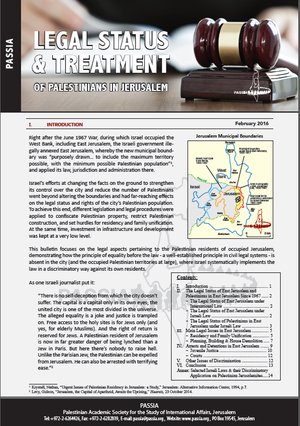Legal Status & Treatment of Palestinians in Jerusalem
Overview
Right after the June 1967 War, during which Israel occupied the West Bank, including East Jerusalem, the Israeli government illegally annexed East Jerusalem, whereby the new municipal boundary was “purposely drawn… to include the maximum territory possible, with the minimum possible Palestinian population, and applied its law, jurisdiction and administration there. Israel’s efforts at changing the facts on the ground to strengthen its control over the city and reduce the number of Palestinians went beyond altering the boundaries and had far-reaching effects on the legal status and rights of the city’s Palestinian population. To achieve this end, different legislation and legal procedures were applied to confiscate Palestinian property, restrict Palestinian construction, and set hurdles for residency and family unification. At the same time, investment in infrastructure and development
was kept at a very low level. This bulletin focuses on the legal aspects pertaining to the Palestinian residents of occupied Jerusalem, demonstrating how the principle of equality before the law - a well-established principle in civil legal systems - is absent in the city (and the occupied Palestinian territories at large), where Israel systematically implements the law in a discriminatory way against its own residents. As one Israeli journalist put it:
“There is no self-deception from which the city doesn’t suffer. The capital is a capital only in its own eyes; the united city is one of the most divided in the universe. The alleged equality is a joke and justice is trampled on. Free access to the holy sites is for Jews only (and yes, for elderly Muslims). And the right of return is reserved for Jews. A Palestinian resident of Jerusalem is now in far greater danger of being lynched than a Jew in Paris. But here there’s nobody to raise hell. Unlike the Parisian Jew, the Palestinian can be expelled from Jerusalem. He can also be arrested with terrifying ease.”

